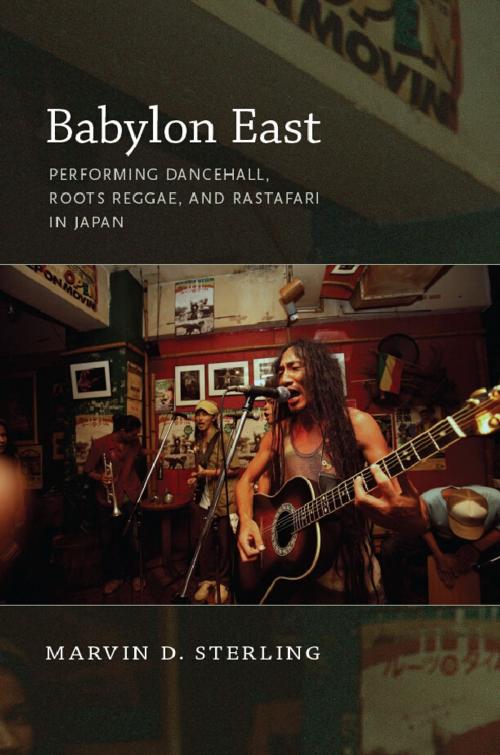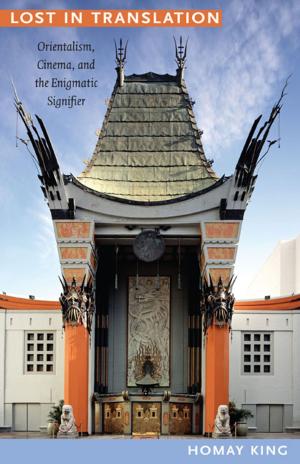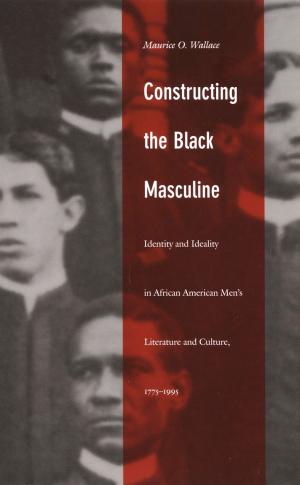Babylon East
Performing Dancehall, Roots Reggae, and Rastafari in Japan
Nonfiction, Entertainment, Music, Music Styles, Reggae, Theory & Criticism, Ethnomusicology, Social & Cultural Studies, Social Science, Anthropology| Author: | Marvin Sterling | ISBN: | 9780822392736 |
| Publisher: | Duke University Press | Publication: | June 29, 2010 |
| Imprint: | Duke University Press Books | Language: | English |
| Author: | Marvin Sterling |
| ISBN: | 9780822392736 |
| Publisher: | Duke University Press |
| Publication: | June 29, 2010 |
| Imprint: | Duke University Press Books |
| Language: | English |
An important center of dancehall reggae performance, sound clashes are contests between rival sound systems: groups of emcees, tune selectors, and sound engineers. In World Clash 1999, held in Brooklyn, Mighty Crown, a Japanese sound system and the only non-Jamaican competitor, stunned the international dancehall community by winning the event. In 2002, the Japanese dancer Junko Kudo became the first non-Jamaican to win Jamaica’s National Dancehall Queen Contest. High-profile victories such as these affirmed and invigorated Japan’s enthusiasm for dancehall reggae. In Babylon East, the anthropologist Marvin D. Sterling traces the history of the Japanese embrace of dancehall reggae and other elements of Jamaican culture, including Rastafari, roots reggae, and dub music.
Sterling provides a nuanced ethnographic analysis of the ways that many Japanese involved in reggae as musicians and dancers, and those deeply engaged with Rastafari as a spiritual practice, seek to reimagine their lives through Jamaican culture. He considers Japanese performances and representations of Jamaican culture in clubs, competitions, and festivals; on websites; and in song lyrics, music videos, reggae magazines, travel writing, and fiction. He illuminates issues of race, ethnicity, gender, sexuality, and class as he discusses topics ranging from the cultural capital that Japanese dancehall artists amass by immersing themselves in dancehall culture in Jamaica, New York, and England, to the use of Rastafari as a means of critiquing class difference, consumerism, and the colonial pasts of the West and Japan. Encompassing the reactions of Jamaica’s artists to Japanese appropriations of Jamaican culture, as well as the relative positions of Jamaica and Japan in the world economy, Babylon East is a rare ethnographic account of Afro-Asian cultural exchange and global discourses of blackness beyond the African diaspora.
An important center of dancehall reggae performance, sound clashes are contests between rival sound systems: groups of emcees, tune selectors, and sound engineers. In World Clash 1999, held in Brooklyn, Mighty Crown, a Japanese sound system and the only non-Jamaican competitor, stunned the international dancehall community by winning the event. In 2002, the Japanese dancer Junko Kudo became the first non-Jamaican to win Jamaica’s National Dancehall Queen Contest. High-profile victories such as these affirmed and invigorated Japan’s enthusiasm for dancehall reggae. In Babylon East, the anthropologist Marvin D. Sterling traces the history of the Japanese embrace of dancehall reggae and other elements of Jamaican culture, including Rastafari, roots reggae, and dub music.
Sterling provides a nuanced ethnographic analysis of the ways that many Japanese involved in reggae as musicians and dancers, and those deeply engaged with Rastafari as a spiritual practice, seek to reimagine their lives through Jamaican culture. He considers Japanese performances and representations of Jamaican culture in clubs, competitions, and festivals; on websites; and in song lyrics, music videos, reggae magazines, travel writing, and fiction. He illuminates issues of race, ethnicity, gender, sexuality, and class as he discusses topics ranging from the cultural capital that Japanese dancehall artists amass by immersing themselves in dancehall culture in Jamaica, New York, and England, to the use of Rastafari as a means of critiquing class difference, consumerism, and the colonial pasts of the West and Japan. Encompassing the reactions of Jamaica’s artists to Japanese appropriations of Jamaican culture, as well as the relative positions of Jamaica and Japan in the world economy, Babylon East is a rare ethnographic account of Afro-Asian cultural exchange and global discourses of blackness beyond the African diaspora.















